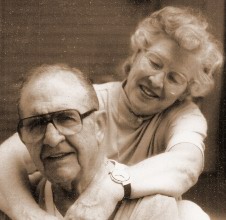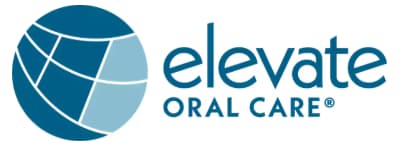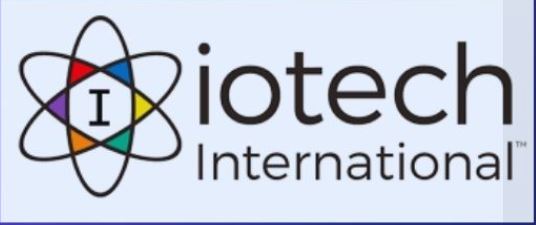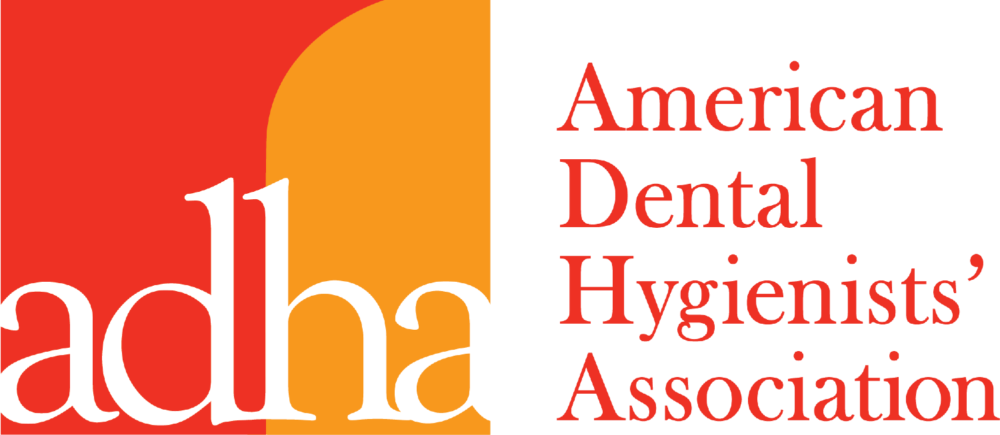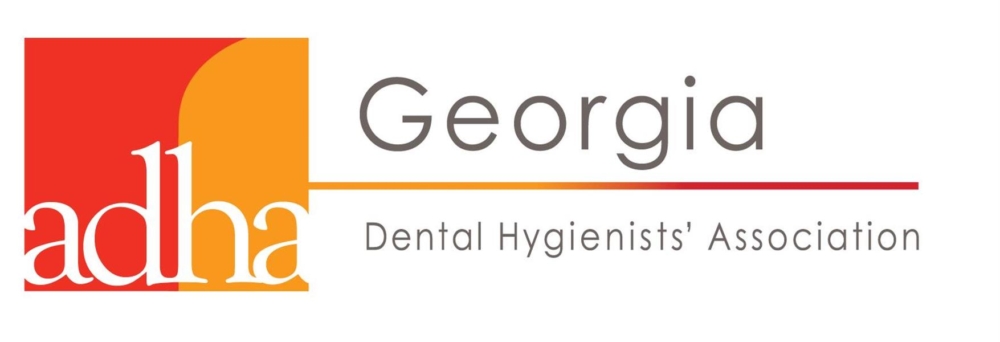Pamela Cushenan, RDH, MS receives her fellowship in special care dental hygiene from SCDA President Zwetchkenbaum and co-chairs Miller and Karen Fallone.
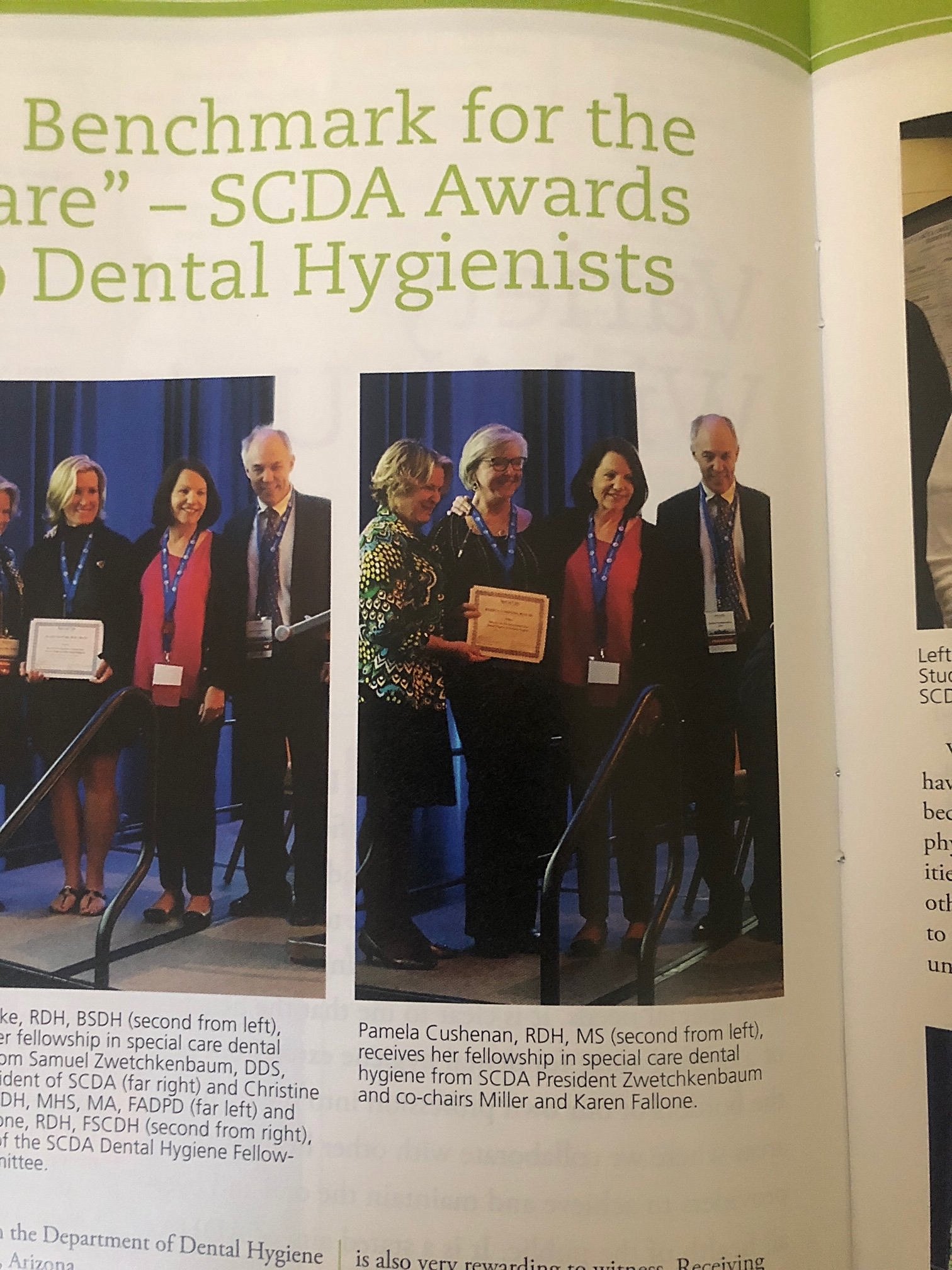
Pam has written for many professional magazines on the topics of Alzheimer's disease and our aging population. Some of her published articles on these topics are below.




Aging Advocacy
A hygienist's story of working with the elderly and making change happen.
by Pam Cushenan, RDH, MS
As a dental hygienist and dental hygiene educator, I've been privileged to provide oral health care and education to tens of thousands of individuals. Like many oral health professionals, this has allowed me the opportunity to focus my energies on promoting the well being of patients, especially our older adult population. My particular methods of achieving these goals are accomplished through my oral health education & training company, as a dental hygiene educator, and through countless legislative efforts.
Hands-On Education
I've always had a special place in my heart for the older adult population. In 1995, an assisted living home with an Alzheimer's unit was built next to my dental office. This changed our patient balance, which resulted in a need for me to research special needs care. Many of our new older adult patients presented poor oral hygiene, moderate-severe infection, and multiple restorative needs. Medically compromised conditions, medications, and cognitive impairment levels had to be carefully considered when planning for patient care. For many of these residents, it was apparent that family and professional caregivers were needed to assist in overseeing or providing basic daily oral hygiene and/or assistive oral hygiene devices would be helpful.
For my cognitively impaired patients, I would have the attending family member or Certified Nursing Assistant (CNA) accompany the resident and I to the operatory, where I would involve them in the assessment and oral hygiene instruction process. This went on for a couple of years as I learned more about how to work with my older adult patients. In time, I recognized the great need for families and residents everywhere to receive this type of information in a way that would be more effective. This led me to return to the higher education system where I completed my Bachelor's and Master's Degrees.
My Master of Science Degree concentration is in Training & Development. This helps me to be a more effective educator and develop the tools for various training programs. I replaced the less effective in-service of the past with a full-service kinesthetic learning experience that has received excellent feedback from attendees. I created my company, SOFT Smiles: Senior Oral Focused TrainingTM (www.softsmiles.com), in 2006.
SOFT Smiles™ is born'
SOFT Smiles™ has a variety of programs. These include training CNA's at individual facilities, as well as a Train-the-Trainer program. Our most recent four-day SOFT Smiles Train-the-Trainer event resulted in approximately 140 supervisory staff members being trained. They will train three thousand CNA's, who provide care for up to sixty-five hundred residents in forty-nine nursing homes.
In addition to caregiver training, a growing number of our functionally independent seniors request presentations of the latest information on oral health products and assistive aids. I also conduct seminars for dental professionals on aging-related topics. The key to improved geriatric oral health care is to share what works to enhance our assessments, treatment, assistive care training techniques and increase patient assessibility to care.'
In 2002, I began working as a part-time clinical instructor in the dental hygiene program at Georgia Perimeter College in Dunwoody, GA. Two years later, I joined the excellent faculty of GPC on a full-time basis. My course, "Dental Management of the Medically Compromised Patient" leads our students through the organ systems and functions affected by aging, as well as provides application methods for modification of patient care based on assessments.
To increase our students' knowledge base of geriatric patient care I share SOFT Smiles™ training methods, materials and product displays. In "Diet, Nutrition and Oral Health", students learn the significance of nutritional impact on the oral cavity and general health of our elders. The student develops tools to assess, counsel and/or refer patients with more complex medical needs.
These courses not only provide our students with valuable information about our aging population, they also enhance our students' clinical skills with this population prior to graduation. Based on their clinical and didactic experiences, our students are all too aware of the great need for increased professional care in the older adult community.
Making a difference
One way that I've been able to increase a professional dental presence is by writing for the Alzheimer's Association magazine, Georgia Chapter. Another way is by staying legislatively active. Being a member in ADHA since I became a student in 1985, my dental hygiene association members have taught and supported me in being an effective advocate for change.
For example, the Georgia Dental Hygienists' Association submitted the issue, "Access to Preventive Oral Health Care" to the Coalition for Georgia's Elderly, which was then selected as its top priority. We traveled all over Georgia, spoke to many interested groups, wrote letters, magazine articles, visited our legislators and made many phone calls in our effort to assist this effort. The law has not yet changed. However, we will not abandon the hundred thousand plus older adults in Georgia who need our help.
Too many of our older adult population, especially our nursing home and homebound patients, have little or no professional dental care. All too soon, this individual will be your grandparent, parent, spouse, or you. Calling and writing our legislators on a state and national level does make a difference. When we join together as professional associations and concerned citizens, our voice becomes stronger, our message clearer, and the opportunity for positive change becomes greater.
"Good Oral Health for Life" is my favorite motto. Let's work together to make this healthful condition an attainable reality for our elders.
A 1987 graduate of Tennessee State University and MeHarry Medical College, Pam Cushenan, RDH, MS, began serving the public in the private practice setting. Despite working full-time, she often volunteered within the community to provide education, screenings and preventive health care. A strong supporter of her professional association, she has held a variety of offices and committee positions. This has led to a number of speaking engagements, such as dental hygiene program graduation ceremonies, Senate subcommittee meetings, Georgia Coalition of Aging conferences, and continuing education courses. Her interaction with the aging special needs increased during her last twelve years in private practice. In this setting, she provided individual caregiver instructions in assessments and basic care techniques during patient appointments. Three years of research went into various teaching methodologies and aging special needs oral care techniques and products to develop a training system for the caregiver. A dental hygiene educator since 2004, she continues to hone these person-centered learning techniques with her students and caregivers.
Pam Cushenan, a licensed dental hygienist since 1987, has provided oral health care to patients in dental offices and in volunteer situations in Georgia and Tennessee. SOFT Smiles is an oral health education and training program she developed in 2006 to train caregivers to provide daily mouth care to aging special needs patients. She is now an educator in the dental hygiene program at Georgia Perimeter College in Dunwoody, GA where she has served since 2004.
Pam Cushenan, RDH, BSHA, MS TDEV
SOFT Smiles: Senior Oral Focused Training
3000 Canton Hills Drive, Marietta, GA 30062-6746
678-468-2535 (cell)
pam@softsmiles.com | www.softsmiles.com
"Good Oral Health for Life"

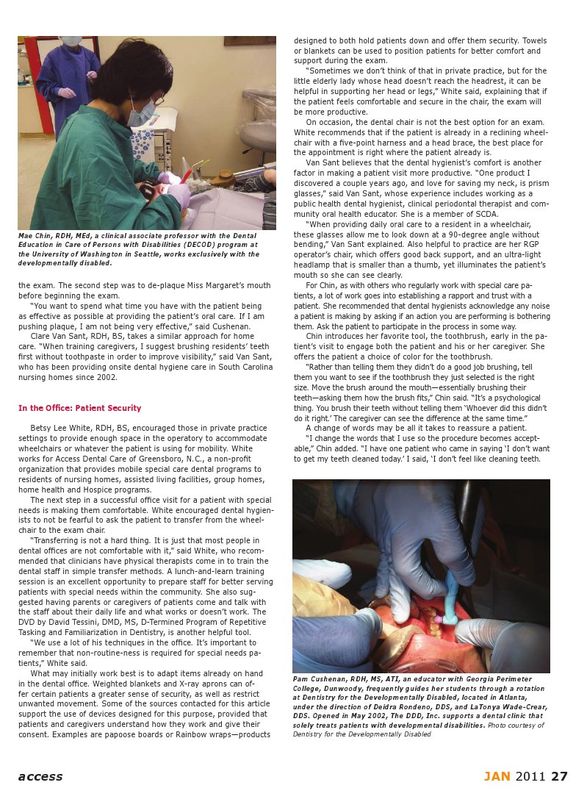

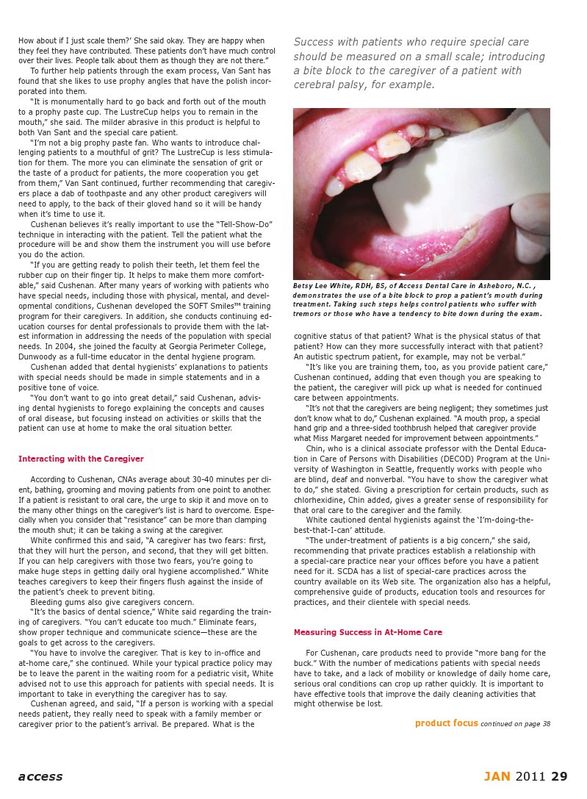

How-to guide for IME
ADA resource covers use of incurred medical expense option to cover dental care costs
By Stacie Crozier, ADA News staff
A new resource developed by the ADA Council on Access, Prevention and Interprofessional Relations offers dental professionals, state and county Medicaid caseworkers and nursing home residents and their representatives information on how to use the incurred medical expense mechanism-or IME-to cover dental care costs.
The IME option, widely used by residents who need new eyeglasses, hearing aids or podiatry services, can also be applied to dental services that are medically necessary but not covered by Medicaid, said Dr. Gregory J. Folse, a member of the ADA National Elder Care Advisory Committee.
"The law is not new, but the dental profession has not widely applied it to funding for needed dental care," said Dr. Folse. "Using the IME option requires state governments to process a fair amount of paperwork and there is a learning curve for dentists, nursing homes, patients and government representatives. But now dentists have a tool that they can use to understand how they can treat patients they serve in nursing homes and get paid for the services they provide."
Essentially, the process enables nursing facility residents to use their monthly income, usually applied to their nursing home care, to receive health care services not covered under Medicaid. The resident makes an arrangement with the caseworker to reduce his or her payment toward expenses at the nursing facility during that month and use the funds to pay for the health care services. Medicaid temporarily increases the amount it pays to the facility, so the end result is that the patient receives the care, the health care provider is paid at his or her private rate and the nursing home is still receiving its normal monthly fee.
The document includes guidelines for three distinct groups: dental professionals; state and county Medicaid caseworkers; and nursing home residents and their representatives.
"We're very excited to provide this information to dentists across the U.S., as well as to caseworkers, patients and their nursing facility staffs," said Dr. Folse, "because it gives dentists the opportunity to increase access to care for this population group. This document will also give guidance to nursing homes and health department staff on how to implement this funding mechanism."
"The process of using the IME option is not intuitive and is quite complicated," said Dr. Michael Helgeson, another NECAC member. "It can take four or five months to have state and county government agencies, nursing facility staff, patients and families all up and running. But it's vastly better for the seniors in nursing facilities to receive needed services and it also gives providers the opportunity to receive their private rate."
The IME option is just as accessible for private practice dentists as it is for group practices, Dr. Helgeson added.
"If a private dentist wants to serve a local nursing home, using the IME option can really open up opportunities for him or her to serve people in the community who really need the care."
